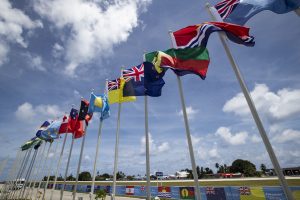Some speculate that Kiribati’s exit from the Pacific Islands Forum was a decision influenced by China amid the current geopolitical tension between Australia, China and the United States. While China denied this, the conjecture gains force from the fact that Kiribati signed 10 trade agreements with China during Foreign Minister Wang Yi’s visit in May. Furthermore, Kiribati has demonstrated a pro-Beijing stance since cutting ties with Taiwan in 2019.
However, the more tenable view is that this very departure has nothing to do with China. There are four reasons.
First, Kiribati’s withdrawal makes no strategic sense for China. Rather, China apparently wanted to be present at the Pacific Islands Forum. Chinese defense officials reportedly posed as reporters in order to attend. Also, Kiribati’s withdrawal disrupted the symbolic Pacific unity but it would not lead to what China wants – having more Pacific allies. A real pawn would have served China better by attending the Forum, gaining information, and speaking on China’s behalf.
Second, Solomon Islands has even closer ties with China in light of their recent security pact. Like many other Pacific countries, they too have cut ties with Taiwan. Yet, Solomon Islands attended the Forum. Logically, had China really been dissuading Pacific countries from attending the Forum, there would have been more departures other than Kiribati alone.
Third, the protest via exit originated from Kiribati’s desire to have their voice be heard and to have fairer representation in the PIF. China would not have advised – contrary to their own political appetite – a protesting approach via boycott, withdrawal, or coercion.
In Kiribati’s letter explaining the departure, it pointed out that the secretary general of the Forum should be rotated among Polynesian, Melanesian and Micronesian members. Yet, to their disappointment, this “gentleman’s agreement” was not fulfilled at the election in 2021, with a Polynesian chosen as the secretary general despite it being a Micronesian’s turn. This was a “matter of principle” to Kiribati, which involved “equity, equality and inclusiveness.” Kiribati claimed that it never signed or approved the Suva Agreement, a compromise reached to bring the Micronesian states back into the PIF.
Finally, instead of being swayed by China to exit, the withdrawal occurred after Kiribati felt ignored, excluded, and disappointed by other PIF members. This can be discerned from another reason Kiribati cited for its departure: that the schedule of the PIF meeting conflicted with Kiribati’s National Day celebrations. Kiribati further said that they had requested a deferral but it was neither considered nor acknowledged. The Forum organizers and other Pacific Island countries certainly know the significance and dates of Kiribati’s National Day events, so the scheduling clash was hardly a coincidence.
Thinking from Kiribati’s standpoint, their protest via withdrawal as a bid for more attention is very understandable. Among the Pacific Island countries, Kiribati suffers most from climate change; has the lowest GDP per capita; has the poorest access to sanitation and clean water; and the highest NEET rate (i.e. youths not in education, employment, or training)
Kiribati apparently left open a path to rejoin the PIF by mindfully emphasizing that their decision to withdraw “was never meant to offend or be against any of our Pacific Island brothers and sisters.” Last year the Micronesian members also quit over the question of the Forum’s secretary general – and they rejoined this year, albeit without Kiribati. The possibility of Kiribati rejoining in the future reinforces the view that the (temporary) withdrawal was just an attention-seeking strategy, which has nothing to do with China.
Offloading the blame on China not only fails to compellingly explain the incident, but it also distracts focus from the region’s internal problems. The Pacific Islands need to rethink the future of their unity, especially when this incident evinced the potential for discord between Polynesian, Melanesian, and Micronesian countries.

































